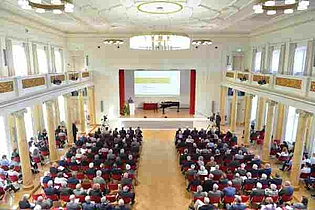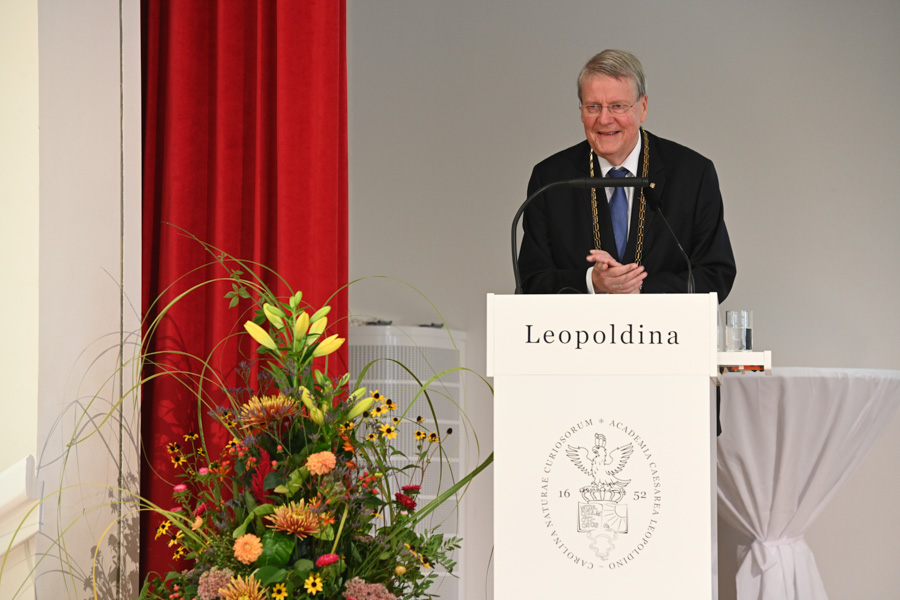News | Saturday, 21 September 2019
Time in Nature and Culture – Annual Assembly 2019
The Leopoldina is dedicating its Annual Assembly 2019 to the topic of “Time in Nature and Culture”. From 20 to 21 September, scientists will come together in Halle (Saale) to discuss technological developments and societal change. The scientific coordinator of the Annual Assembly 2019 is the mathematician and computer scientist Prof. Dr. Thomas Lengauer, Member of the Leopoldina Presidium.
As part of the Annual Assembly, awards and medals were presented to outstanding scientists. The Minister President of the federal state of Saxony-Anhalt Dr. Reiner Haseloff spoke at the opening ceremony. “A relatively new concept in public discourse is ‘chronopolitics’, or the politics of time. This is becoming more and more important in how we structure the ways in which we humans coexist. Time is our scarcest resource. In politics, too, time has a major role to play. Social media and the internet have led to drastic changes in the political conversation. In terms of time, political developments unfold very differently than they did three or four decades ago. This is just one context that makes the Annual Assembly’s theme so topical,” said Dr. Reiner Haseloff, Minister President of the federal state of Saxony-Anhalt, on occasion of the opening ceremony.
“Humans have always been fascinated by time. It gives us a sense of direction, but our perceptions of it are very subjective. Scientists work with enormous timescales stretching over millions of years, but also measure processes which take place within nanoseconds. The topic of time is a thoroughly multifaceted one that spans a range of different disciplines. So I’m delighted that Time in Nature and Culture is at the heart of this year’s Annual Assembly,” said Prof. Dr. Jörg Hacker, President of the Leopoldina, in his opening speech.
The speakers giving lectures at this year’s Annual Assembly are outstanding scientists from the different disciplines represented within the Leopoldina. They include Felicitas Pauss (Geneva/Switzerland), who will take her audience on a trip back in time to the Big Bang; Prof. Dr. David Poeppel (Frankfurt/Germany), who will look at rhythms in speech and in the brain; Prof. Dr. Charles A. Czeisler (Boston/USA), who researches chronomedicine; and Prof. Dr. Gabriele Doblhammer (Rostock/Germany), who will speak about the links between the seasons of the year and birth, health, and death. The Annual Assembly is divided into six specialist sessions: Physics, Technology and Chemistry, Philosophy and Psychology, Chronobiology and Chronomedicine, Developmental Processes Over Time, and Time and Life. The scientific coordinator of the Annual Assembly 2019 is the mathematician and computer scientist Prof. Dr. Thomas Lengauer, Member of the Leopoldina Presidium.
More than 50 talented school pupils from across Germany also made it onto the guest list for this year’s Annual Assembly. They will be listening to the scientific presentations during the event and will have the chance to talk to researchers. The school pupils programme is made possible by the support of the Wilhelm and Else Heraeus Foundation in cooperation with the Society of German Natural Scientists and Physicians.
Prizes and Medals
As part of the opening ceremony, the Leopoldina presented awards and medals to outstanding scientists. The Cothenius Medals, the Carus Medals, the Mendel Medal, the Schleiden Medal, the Georg Uschmann Award for the History of Science, and the Leopoldina Prizes for Junior Scientists are presented at the Annual Assembly every two years.
Impressions from the event
Videos
Video Clip (Youtube) Friday, 20 September 2019
Video Clip (Youtube) Saturday, 21 September 2019






















